This study explores Jordanian EFL learners' perceptions of language learning through blogging, focusing on 10 postgraduate students enrolled in an English intensive course. Findings indicate that learners found blogging beneficial for enhancing their English skills and facilitating peer interaction, suggesting that integrating blogs into language instruction can positively impact learning. The study emphasizes the role of social networks like blogs in facilitating independent learning and improving language acquisition.
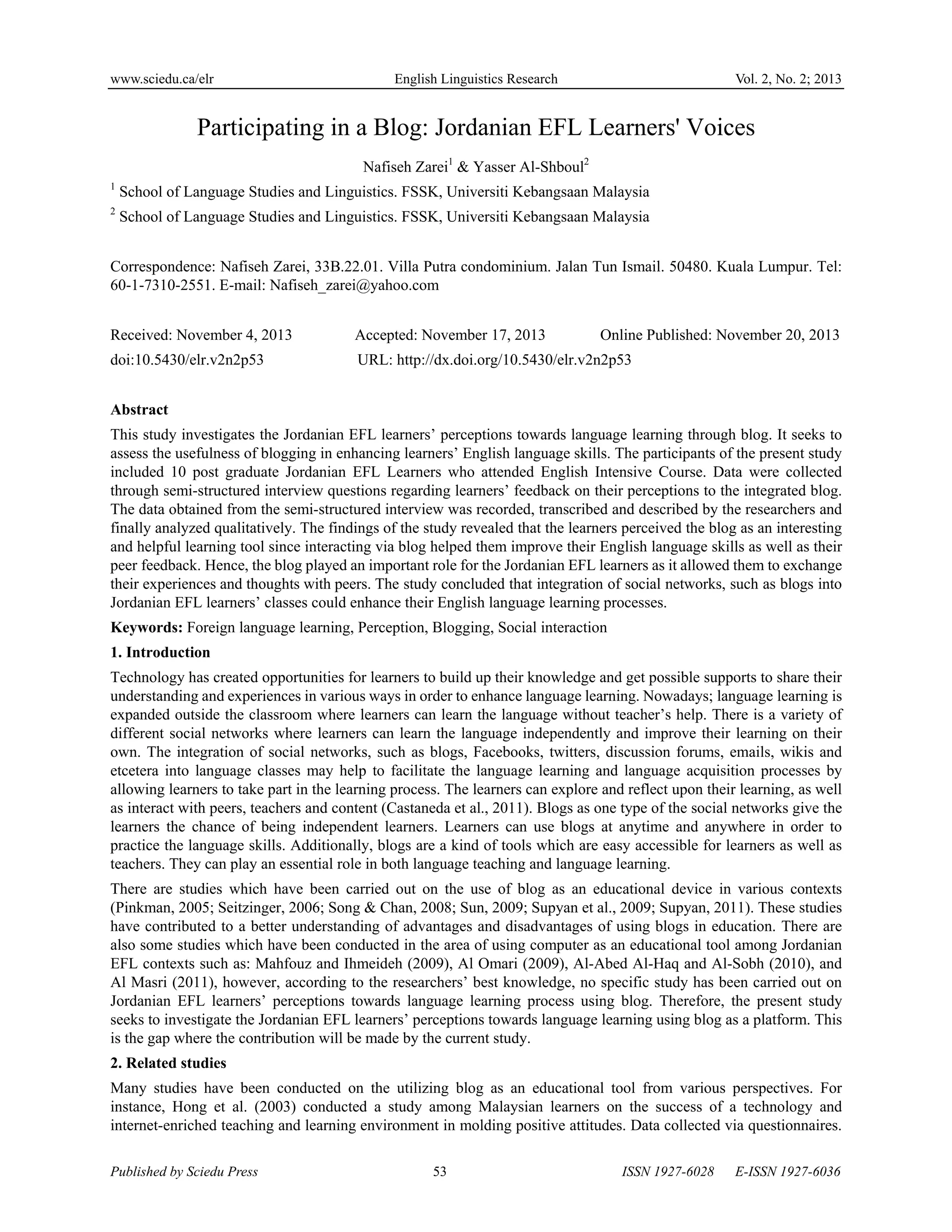
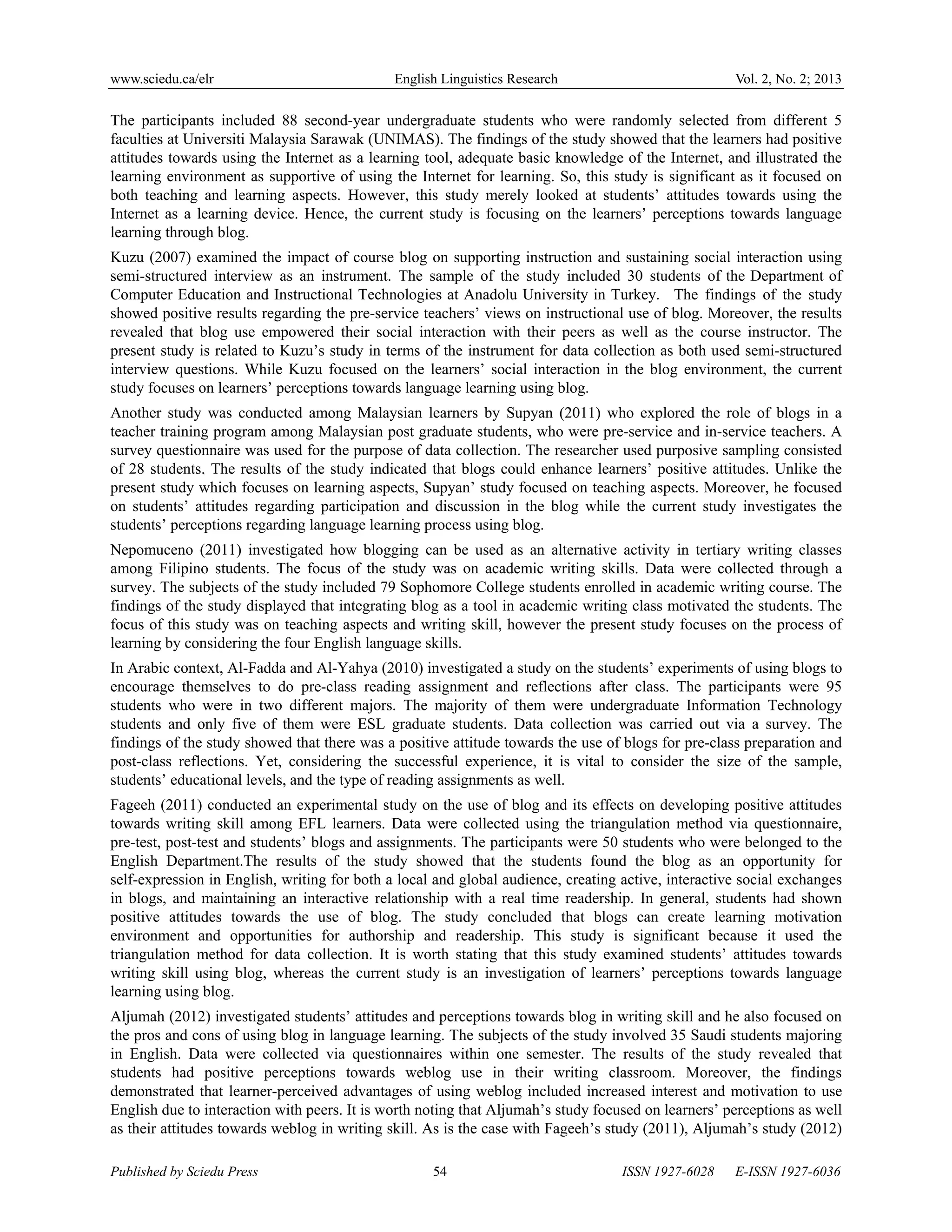
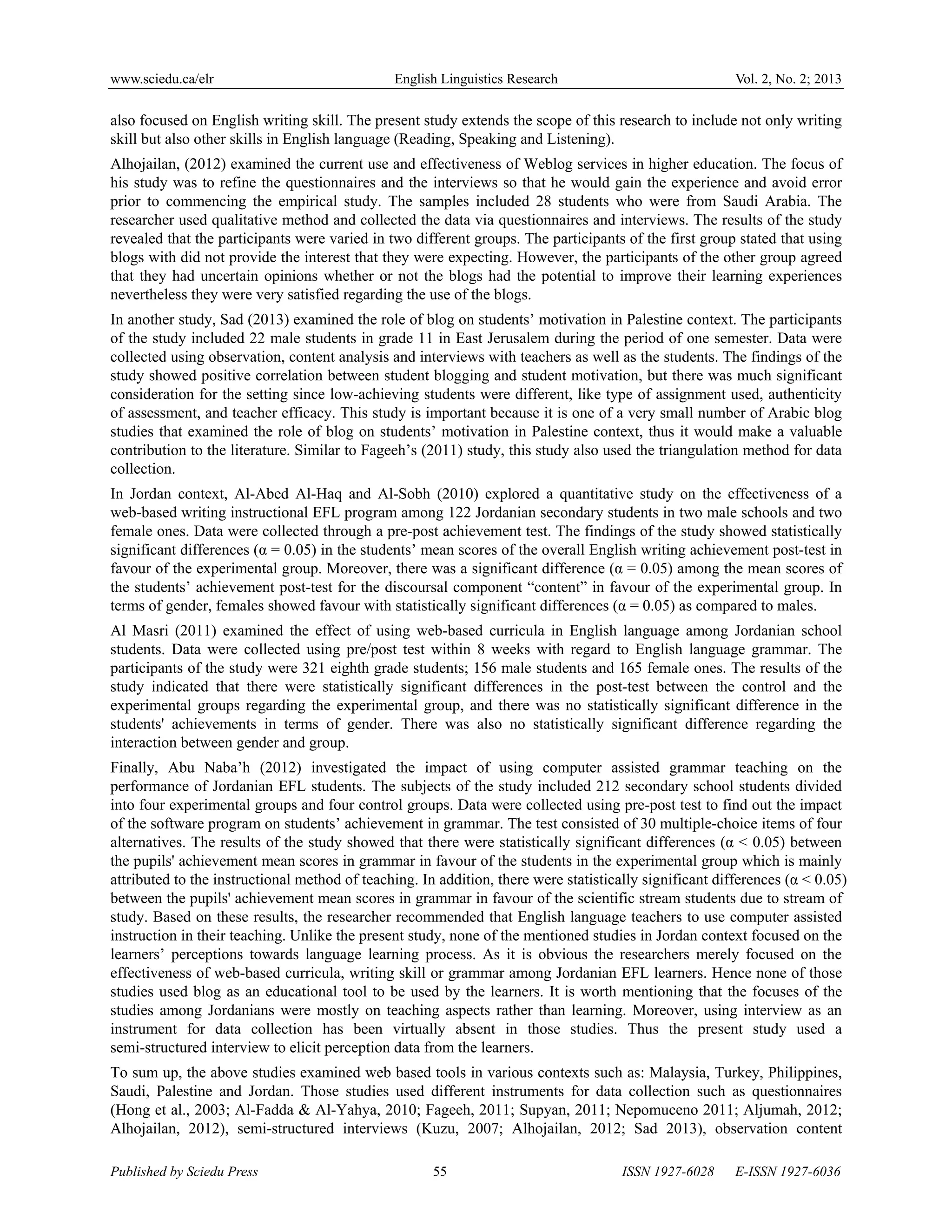
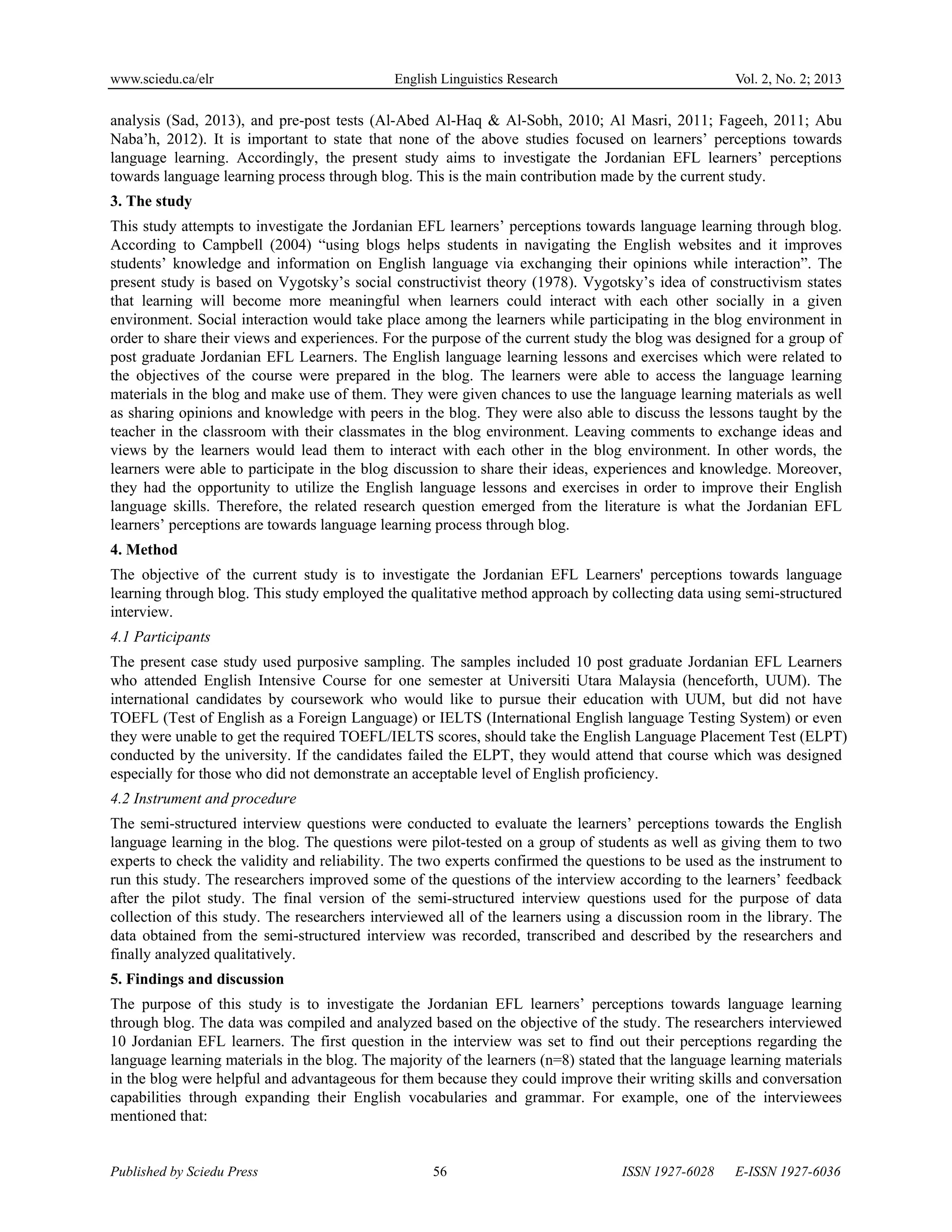
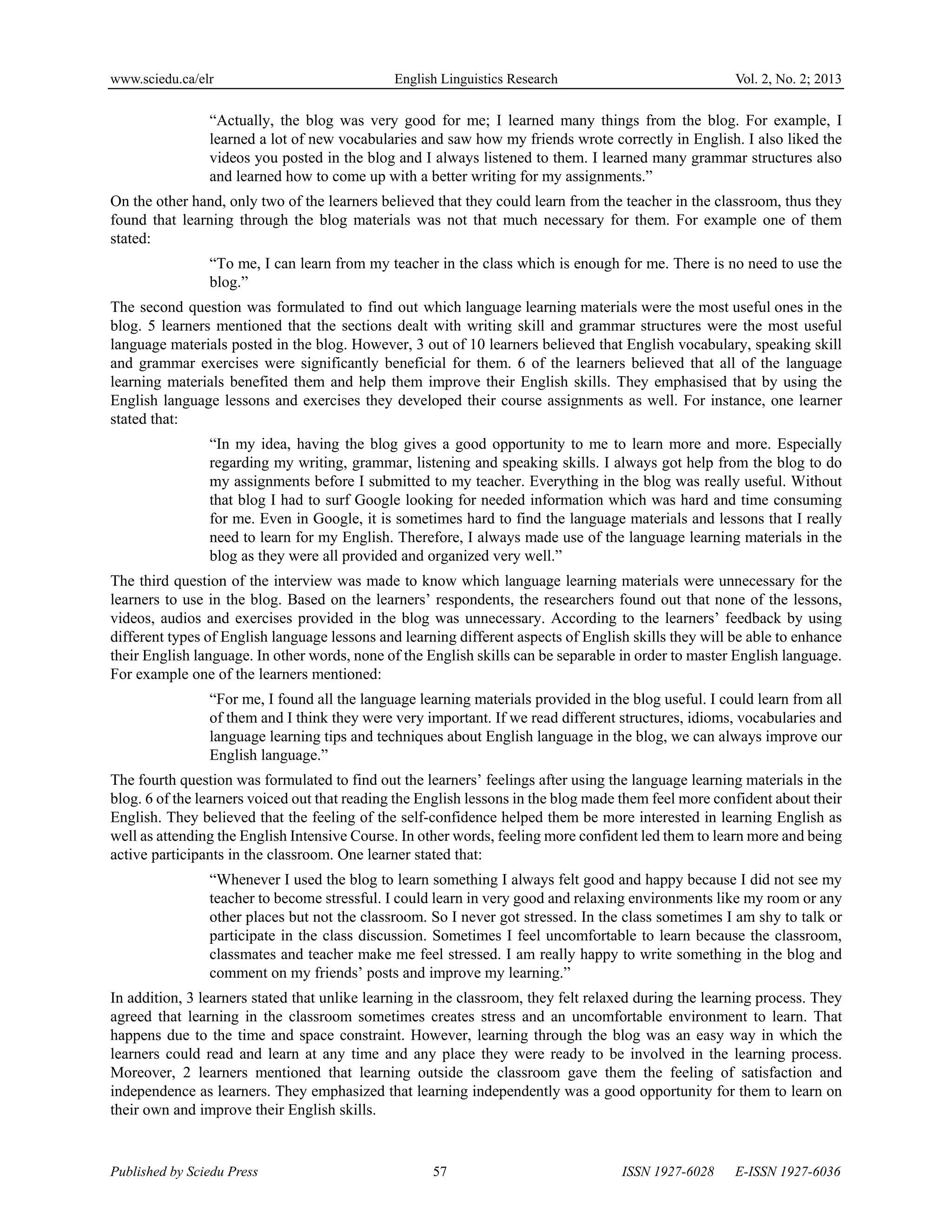
![www.sciedu.ca/elr English Linguistics Research Vol. 2, No. 2; 2013
Published by Sciedu Press 58 ISSN 1927-6028 E-ISSN 1927-6036
The next question was made in order to understand if the learners learned more since using the blog or not. Based on
the learners’ responses, the researchers came to the conclusion that the learners could become familiar with a lot of
aspects in English language by integrating the blog to their English Intensive class. The learners mentioned that there
were a lot of new knowledge and information that they acquired and learned through the language learning materials in
the blog. According to their feedback, although the teacher taught some English lessons in the classroom, however the
learners learned many extra English grammar, vocabularies and skills which were not mentioned by the teacher in the
classroom. All in all, the learners were satisfied that they learned more via using the blog as an English language
learning platform. For example one learner stated:
“Of course I learned more. I could use the English language materials at any time and refer to the
grammar lessons when I needed them. So unlike the class which was only for two hours, the blog could
provide learning process at anytime with no boundary. So I learned a lot via using the blog and I think
if I did not use it, I would not learn this much. We can learn in the classroom but not everything in
detail; however in the blog we can learn almost everything. I want to say that by using the blog I really
learned more.”
The last question was set to investigate if the learners faced any difficulties while using the language learning
materials in the blog. The majority of the learners stated that they did not have any problems to access and read the
English language learning materials in the blog. However, merely 2 learners mentioned that having slow internet
connection sometimes affected their language learning processes.
“I think those students who could use computer and internet were able to use the blog which is very
easy and simple. So I did not have any problems whenever I used the blog. It was always easy and
interesting.”
Based on the findings of the present study, the researchers would like to emphasize that integrating blog in EFL
classrooms would benefit the learners to enhance their processes of language learning. In other words, it can be
suggested that integrating social networks in English language classes in Jordan context, could contribute to teaching
and learning processes. Hence, the traditional way of teaching and learning English language should not be the only
focus for the teachers and learners. It is worth mentioning that, the social interaction which takes place in the
discussion forum of the blog is beneficial for the learners to learn new knowledge and information from their peers
as well as increasing their critical thinking.
6. Conclusion
In conclusion, the results of the present study indicated that the Jordanian EFL learners were satisfied about using the
language learning materials in the blog to enhance their English language. The blog provided them the much needed
communication and discussion outside the classroom environment. The learners perceived the blog as an interesting
and helpful learning tool since interacting via blog helped them improve their English language skills as well as their
peer feedback. Hence, the blog played a significant role for the Jordanian EFL learners as it allowed them to share their
experiences, information, knowledge and thoughts with peers. Learning English language via the blog could facilitate
their processes of learning. Making blog available in the context of this study could motivate the Jordanian EFL
learners to participate not only in the blog discussion but also the class activities.
References
Al-Abed Al-Haq, F. & Al-Sobh, M. (2010). The effect of a web-based writing instructional EFL program on
enhancing the performance of Jordanian secondary students. Jaltcalljournal, 6 (3), 189-218.
Al-Fadda, H. Al.-Yahya, M. (2010). Using web blogs as a tool to encourage pre-class reading, post-class reflections
and collaboration in higher education. US-China Education Review, 7 (7), 100-106.
Aljumah, H. F. (2012). Saudi Learner Perceptions and Attitudes towards the Use of Blogs in Teaching English
Writing Course for EFL Majors at Qassim University. English Language Teaching, 5 (1), 100-116.
Alhojailan, M. (2012). The current use and effectiveness of Weblogs as e-learning tools in higher education. 3rd
International Conference on e-Education, e-Business, e-Management and e-Learning, Singapore, IACSIT Press.
[Online] Available: http://www.ipedr.com/vol27/23-IC4E%202012-F00031.pdf
Al Masri, A. (2011). The Impact of Using Web- Based Curricula on Jordanian Schools Students’ Achievement in
English Language. Barcelona European Academic Conference. [Online] Available:
http://conferences.cluteonline.com/index.php/IAC/2011SP/paper/viewFile/476/482](https://image.slidesharecdn.com/blogging-jordan-151121125438-lva1-app6891/75/Participating-in-a-Blog-Jordanian-EFL-Learners-Voices-6-2048.jpg)
![www.sciedu.ca/elr English Linguistics Research Vol. 2, No. 2; 2013
Published by Sciedu Press 59 ISSN 1927-6028 E-ISSN 1927-6036
Alomari, A. (2009). Investigating online learning environments in a web-based math course in Jordan. International
Journal of Education and Development using ICT, 5 (3), 19-36.
Campbell, A. P. (2004). Using live journal for authentic communication in EFL classes. The Internet TESL Journal,
10 (9), 51-62.
Castaneda, D., Ahern, T., & Díaz, S. (2011). Teaching and learning the Spanish aspect using blogs and wikis: An
exploratory study. IALLT Journal of Language Learning Technologies, 41 (1), 64-89.
Fageeh, A., I. (2011). EFL Learners’ Use of Blogging for Developing Writing Skills and Enhancing Attitudes
Towards English Learning. Journal of Language and Literature, 2 (1), 31-48.
Hong, K.-S., Ridzuan, A. A., & Kuek, M.-K. (2003). Students' attitudes toward the use of the Internet for learning: A
study at a university in Malaysia. Educational Technology & Society, 6 (2), 45-49.
Kuzu, A. (2007).Views of pre-service teachers on blog use for instruction and social interaction. Turkish Online
Journal of Distance Education-TOJDE, 8 (3), 34-51.
Mahfouz, S. & Ihmeideh, F. (2009). Attitudes of Jordanian university students towards using online chat discourse
with native speakers of English for improving their language proficiency. Computer- Assisted Language
Learning, 22 (3), 207-227. http://dx.doi.org/10.1080/09588220902920151
Abu Naba’h, A. M. (2012). The impact of computer assisted grammar teaching on EFL pupils’ performance in
Jordan. International Journal of Education and Development using Information and Communication
Technology, 8 (1), 71-90.
Nepomuceno, M. (2011). Writing Online: Using Blogs as an Alternative Writing Activity in Tertiary ESL Classes.
TESOL Journal, 5. 92-105.
Pinkman, K. (2005). Using Blogs in the Foreign Language Classroom: Encouraging Learner Independence. The
JALT CALL Journal 1(1), 12-24.
Sad., A. (2013). Motivating low-performing 11th graders through blogging: A case study. International Journal of
Instructional Technology and Distance Learning 9 (12), 17-30.
Seitzinger, J. (2006). Be Constructive: Blogs, Podcast, and Wikis as Constructivist learning Tools. Learning
Solutions. e-magazine.7. [Online] Available: http://www3.griffith.edu.au/03/ltn/docs/Design_Strategies.pdf
Song, H. & Chan, Y. (2008). Educational blogging: A Malaysian university students' perception and experience.
Proceedings ascilite Melbourne, 954-963. [Online] Available:
http://www.ascilite.org.au/conferences/melbourne08/procs/song.pdf
Sun, Y. (2009). Voice Blog: An Exploratory Study of Language Learning. Language Learning & Technology 13(2),
88-103.
Supyan, H., Norizan, A., R. & Dalia, S. Q. (2009). Developing Blogs: New dimension in language teacher education.
Paper presented Teaching and Learning of English in Asia (TLEiA Three), Orchid Garden Hotel. Brunei
Darussalam. [Online] Available:
http://maele.net/papers/2009%20developing%20blogs%20TEIFL%20brunei%20supyan%20norizan%20dalia.p
df
Supyan, H. (2011). Using blog to enhance process writing approach: Is there anything new? SoLLs. INTEC.11
International Conference. Language, Culture, & Literacy: Engaging Diversity in Challenging Times, Hotel
Equatorial Bangi, Selangor. [Online] Available:
http://supyanhussin.files.wordpress.com/2011/05/sollsintec-2011-supyan1.pdf
Vygotsky, L. L. S. (1978). Mind in Society: The Development of Higher Psychological Processes. Cambridge:
Harvard University Press.](https://image.slidesharecdn.com/blogging-jordan-151121125438-lva1-app6891/75/Participating-in-a-Blog-Jordanian-EFL-Learners-Voices-7-2048.jpg)